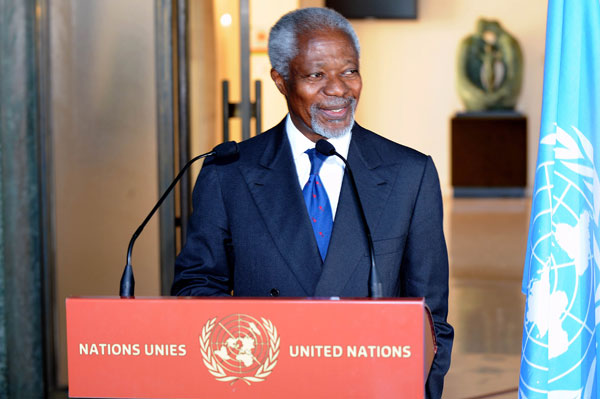Annan mediates on Syrian crisis, Damascus vows to cooperate
 0 Comment(s)
0 Comment(s) Print
Print E-mail Xinhua, March 17, 2012
E-mail Xinhua, March 17, 2012
Special envoy of the United Nations (UN) and Arab League on the Syrian issue Kofi Annan Friday told the UN Security Council to keep "one voice" on the Syrian issue, while the Syrian government vowed to make Annan's mediation "successful".
|
|
| UN-Arab League envoy Kofi Annan smiles as he speaks to the press on March 16, 2012 in Geneva after a videoconference briefing of the United Nations Security Council. Annan said today he would send a technical team to Damascus next week to discuss setting up an international monitoring mission for Syria. Syria's envoy to the UN Bashar Jaafari said the experts were expected in Damascus on March 18. [Xinhua/AFP] |
"There have been some differences but that is also normal, and I hope pretty soon you will be hearing one voice from the council," Annan said.
After meeting with Syrian President Bashar al-Assad and the Syrian opposition leaders in and outside the country, Annan briefed the 15-nation Security Council via videoconference from Geneva.
"I shared with them the consultations I held in the region and the calls I have been making around the world to ensure that there is strong support for the mission and we all agree on one mediation process," Annan said at a press conference after briefing the UN Security Council.
Annan said that the council showed "very strong support" for his mission and the council members seemed determined to work together.
Annan also warned the UN members that "we need to handle the situation in Syria very very carefully. Any miscalculation that leads to major escalation will have impact in the region which will be extremely difficult to manage."
A team would be sent to Syria this weekend to continue the proposals he made with the Syrian government, including stopping violence, accelerating humanitarian assistance and establishing credibility and confidence for the political process when it is initiated, Annan added.
Bashar Ja'afari, Syrian permanent representative to the United Nations, made a statement shortly after the videoconference, saying that Annan had assured members of the Security Council that the Syrian government had engaged with him positively in order to make his mission successful.
"On behalf of the Syrian government, I ensure you that we will make Annan's mission successful," Ja'afari said.
On the same day, Syria's foreign ministry sent two letters to the UN Security Council's chief and the head of the UN Human Rights Council, stressing that Syria has chosen the road of national dialogue to solve the problem it faces through the participation of all Syrian opposition parties and independents.
The ministry said Syria hoped that all UN members will help it get out of the crisis "through ending violence, halting foreign financing of terrorism and restoring security and stability to the country."
As the special envoy and the Syrian government agreed to ensure a successful mediation, the attitudes of different countries towards the Syrian issue varied.
Chinese Foreign Ministry spokesman Liu Weimin said Friday at a regular press briefing that Beijing will make joint efforts with the international community to promote a fair, peaceful and proper settlement of the Syrian issue.
China insists that the Syrian issue should be resolved peacefully through political channels in order to safeguard the fundamental interests of the people of Syria and the Middle East, the peace and stability of the Middle East region as well as the purpose and principle of the UN charter, Liu stressed.
Chinese ambassador to the UN Li Baodong said on Friday that China supports Annan's mediation efforts on the Syrian crisis, calling on the international community to support Annan's efforts and create conditions for his mediation.
Meanwhile, Russian Foreign Minister Sergei Lavrov called on Syria to back up Annan's mission.
"We are constantly working with Kofi Annan and sending relevant signals to Damascus so as to ensure full cooperation between the Annan mission and Syrian leaders," Lavrov said.
Also on Friday, Russian Deputy Foreign Minister Mikhail Bogdanov said Moscow would not allow a repeat in Syria of the Libyan scenario, when the UN Security Council's decisions were implemented "in the wrong way".
Jordanian Foreign Minister Nasser Judeh on Friday urged the international community to solve the Syrian crisis through a political process and said Jordan would do its best to accommodate Syrian refugees who had crossed the border into Jordan.
As Saudi Arabia's decision to close its embassy in Syria was denounced by Russia on Friday, Turkish foreign ministry called on Turkish nationals in Syria to return home and announced it would halt its consular services in Damascus.
The bloody unrest in Syria has lasted for a year and still sees no end. The UN recently said more than 8,000 people had been killed in the turmoil, while the Syrian government said more than 2,000 army and security personnel had been killed by "armed terrorist groups."






